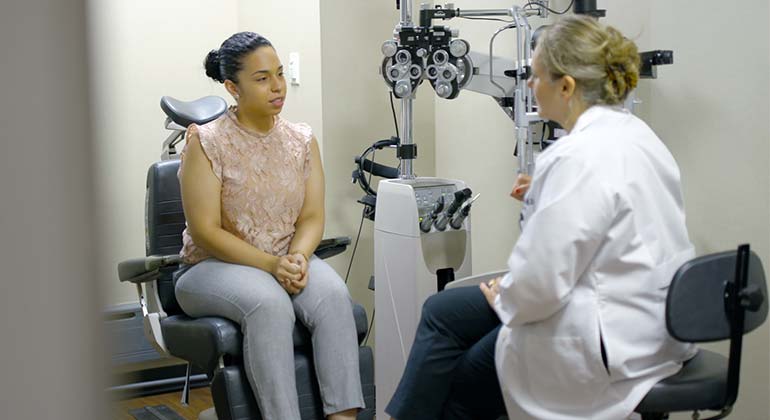Neurologist in Andalusia: Advanced Brain Health Solutions at Our Clinic
Neurologist in Andalusia: Advanced Brain Health Solutions at Our Clinic
Blog Article
Is Refractive Surgery Right for You? Factors to Consider for Better Eyecare
In the realm of eye treatment, the choice to go through refractive surgical treatment is a substantial one that demands thoughtful factor to consider. As individuals seek quality and flexibility from the restraints of restorative lenses, various factors enter play when figuring out the viability of such a procedure. From the intricacies of one's eye wellness to the details of personal assumptions and day-to-day habits, each element holds value in the more comprehensive landscape of refractive surgery candidacy. By evaluating these crucial elements with care and precision, a more clear path in the direction of educated decision-making arises.
Eye Health And Wellness Analysis
When thinking about refractive surgery, a comprehensive eye health and wellness assessment is vital to analyze the suitability of the procedure for every individual. neurologist andalusia. This evaluation involves a collection of examinations and evaluations carried out by an eye care specialist to determine the overall health and wellness of the eyes, the existence of any underlying problems, and the security of the refractive mistake
Throughout the evaluation, different elements are considered, such as the client's case history, present eye prescription, corneal density, pupil dimension, and tear film high quality. These assessments help to recognize any contraindications to refractive surgery, such as corneal irregularities, cataracts, or neglected eye infections. Additionally, the examination aids to take care of patient expectations regarding the prospective end results of the surgery based upon their special eye features.
Inevitably, the eye wellness analysis is necessary in making certain the safety and security and effectiveness of refractive surgical procedure, as it supplies beneficial understandings into the person's eye wellness standing and helps identify the most ideal therapy alternatives for attaining optimal visual results. (neurologist andalusia)
Way Of Living Analysis
A complete lifestyle analysis is integral in establishing the suitability of refractive surgical procedure for an individual's visual improvement requirements. Way of living variables such as occupation, hobbies, and everyday activities play a critical duty in the decision-making procedure regarding refractive surgical procedure.
Moreover, way of living practices such as sports engagement, outside activities, or even skin care regimens can affect the healing procedure and overall success of refractive surgical procedure. By performing a thorough way of life assessment, eye care experts can tailor their recommendations and treatment strategies to fulfill the distinct needs of each person, ultimately leading to boosted visual outcomes and fulfillment.
Assumption Positioning

Establishing reasonable expectations entails complete pre-operative conversations in between the individual and the ophthalmologist. The cosmetic surgeon must transparently connect the prospective risks, advantages, and limitations of the procedure (eye center andalusia). People need to comprehend that while several individuals attain 20/20 vision or much better complying with refractive surgery, some might still need glasses for certain tasks like reading or driving at night. Handling these expectations helps avoid disappointment and frustration post-surgery, bring about an extra positive overall experience for the individual.
Threat Evaluation

Aspects that may enhance the threat of complications include age, particular clinical problems like autoimmune illness, unsteady vision prescription, thin corneas, and unrealistic patient assumptions. Furthermore, choosing a seasoned and experienced cosmetic surgeon, complying with pre and post-operative treatment instructions vigilantly, and revealing any relevant clinical background can aid mitigate threats.
To lessen the likelihood of complications, ophthalmologists conduct detailed pre-operative examinations to identify any type of contraindications to surgery. They likewise talk about the prospective dangers and advantages with clients during the assessment process. By taking part in open interaction and shared decision-making, both the individual and the eye doctor can interact to determine if refractive surgical procedure is the appropriate selection based upon individual threat profiles and preferred outcomes.
Consultation Value
Thinking about the essential role of notified decision-making in analyzing dangers click here to read and possible difficulties in refractive surgery, the examination procedure holds significant value in assisting people towards optimal end results. Throughout the examination, the check here ophthalmologist examines the client's eye wellness, refractive errors, and overall suitability for surgical procedure. This preliminary assessment is important in establishing the most appropriate treatment for every individual, thinking about aspects such as corneal thickness, pupil dimension, and existing eye problems.
Moreover, the examination acts as a possibility for clients to discuss their assumptions, problems, and any questions they may have relating to the surgery. Clear communication between the client and the surgeon is important to make sure reasonable assumptions and a complete understanding of the possible threats and benefits included.
Furthermore, the examination allows the doctor to clarify the various medical options available, their particular outcomes, and the post-operative treatment required. This comprehensive conversation equips people to make educated decisions about their eye treatment, leading to much better satisfaction and outcomes post-surgery.
Conclusion
To conclude, individuals taking into consideration refractive surgical procedure needs to go through a thorough eye health and wellness assessment, evaluate their lifestyle habits, align their assumptions with potential results, examine the involved dangers, and prioritize examinations with eye care specialists. These aspects play a crucial duty in determining the suitability of refractive surgical treatment for each and every person, ensuring ideal results and complete satisfaction with the procedure.
People considering refractive surgery usually have high assumptions regarding the outcomes, expecting perfect vision without the demand for glasses or contact lenses. While refractive surgery can significantly enhance vision and reduce dependence on visual aids, it is vital for patients to comprehend that results may vary based on specific factors such as the level of refractive mistake, corneal density, and overall eye wellness.
By engaging in open communication and shared decision-making, both the individual and the eye doctor can work together to figure out if refractive surgery is the best selection based on private threat accounts and preferred outcomes.
Thinking about the important duty of informed decision-making in analyzing risks and prospective complications in refractive surgery, the assessment process holds significant relevance in leading individuals towards optimal outcomes. Throughout the examination, the ophthalmologist examines the individual's eye health and wellness, refractive errors, and overall suitability for surgical procedure.
Report this page